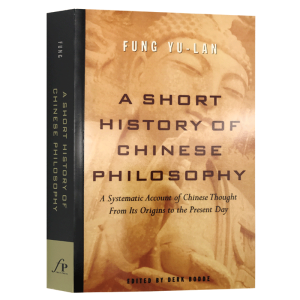
A Short History of Chinese Philosophy《中国哲学简史》打通了古今中外的相关知识,以宏观开阔的视野对中国哲学进行了深入浅出、融会贯通的讲解;在有限的篇幅里融入了冯友兰对中国哲学的理解,是史与思的结晶,充满了人生的睿智与哲人的洞见,寄托着对现实的人文关怀。
本书是广大读者学习中国古典文化、借鉴中国传统智慧、启迪现实人生的入门书,也是一部名副其实的、可以影响大众一生的文化经典!
冯友兰(1895—1990),字芝生,河南唐河人。哲学家、哲学史家;曾就学于北京大学、哥伦比亚大学,获哥伦比亚大学哲学博士学位。1928年起,任清华大学哲学系教授兼哲学系主任、文学院院长、校务会议主席,抗战期间任西南联大哲学系主任兼文学院院长。1952年起任北京大学哲学系教授,为中国科学院哲学社会科学学部委员。其主要著作有《中国哲学史》、《新理学》、《新事论》、《新世训》、《新原人》、《新原道》、《新知言》等。
Responsible for reintroduing the study of Chinese philosophy in the 20th century,Feng Yu-lan is considered the father of Neo-Confucianism. He studied at Columbia University and taught at Quinghua University and Peking University. He died in 1990.
To the Westerner, who sees that the life of the Chinese people is permeated with Confucianism, it appears that Confucianism is a religion. As a matter of fact, however, Confucianism is no more a religion than, say, Platonism or Aristotelianism. It is true that the Four Books have been the Bible of the Chinese people, but in the Four Books there is no story of creation, and no mention of a heaven or hell.
Of course, the terms philosophy and religion are both ambiguous. Philosophy and religion may have entirely different meanings for differentpeople. When men talk about philosophy or religion, they may have quite different ideas in their minds concerning them. For my part, what I call philosophy is systematic, reflective thinking on life. Ever3’ man, who has not yet died, is in life. But there are not many who think reflectively on life, and still fewer whose reflective thinking is systematic. A philosopher must philosophize; that is to say, he must think reflectively on life, and then express his thoughts systematically.
This kind of thinking is called reflective because it takes life as its object. The theory of life, the theory of the universe, and the theory of knowledge all emerge from this type of thinking. The theory of the universe arises because the universe is the background of life—the stage on which the drama of life takes place. The theory of knowledge emerges because thinking is itself knowledge. According to some philosophers of the West, in order to think, we must first find out what we can think; that is to say, before we start to think about life, we must first “think our thinking.”
Such theories are all the products of reflective thinking. The very concept of life, the very concept of the universe, and the very concept of knowledge are also the products of reflective thinking. No matter whether we think about life or whether we talk about it, we are all in the midst of it. And no matter whether we think or speak about the universe, we are all a part of it. Now, what the philosophers call the universe is not the same as what the physicists have in mind when they refer to it. What the philosophers call the universe is the totality of all that is. It is equivalent to what the ancient Chinese philosopher, Hui Shih, called “The Great One,” which is defined as “that which has nothing beyond.” So everyone and everything must be considered part of the universe. When one thinks about the universe, one is thinking reflectively.
目前因技术问题,暂不支持移动设备访问,支付完成后,下载位置一般在右上角,显示如“立即下载 密码:****”
强烈建议:虽然本站提供免登录下载服务,但为防止购买后资源无法找到,建议注册并登录后再进行购买和下载操作
有偿反馈:如遇到本站资源失效的情况,加站长联系方式进行问题反馈可免费获取任意一个自选资源
答:本站大部分资源均为免费,收费原因有三:1.资源是高价购来低价分享,2.防止专门卖资源的人投诉资源,3.本站独家资源
问:为什么有些解压包会有密码?
答:为了避免大家在线直接解压!密码一般是:www.yu-er.com,yu-er.com 或者 29901943
温馨提示1:为了网盘内容持续有效,请勿在线解压文件,甚至可能会产生额外的费用。
温馨提示2:网盘中内容均为互联网收集整理,资源里包含的联系方式(含电话、微信、QQ等)请谨慎对待,不要轻信任何人转账和打款要求。
链接失效报错: QQ报错 | benottoknow | yu-er©uoov.com
我们都是爱学习的小耳朵,记得收藏我们哟~

![[未删节]三体英文版电子书+音频 The Three-Body Problem Cixin Liu(epub/pdf/mobi+音频)](https://1.res.yu-er.com/upload/2023/03/1702199209-3ac58e4667e555b.webp?x-oss-process=image/resize,m_fill,h_200,w_300)

![Science A-Z (RAZ科学版,很棒的科普类分级读物)全套资料[音频+视频+PDF+部分教案+练习册]](https://1.res.yu-er.com/upload/2022/10/1665390179-12432d903c2909f.jpg?x-oss-process=image/resize,m_fill,h_200,w_300)
![2023版万唯中考英语词汇+答案(初中单词记背神器)[PDF]](https://1.res.yu-er.com/upload/2022/10/1665387561-50712d8cd5b7a4b.jpg?x-oss-process=image/resize,m_fill,h_200,w_300)